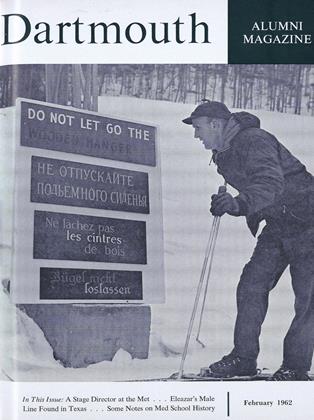DARTMOUTH ALUMNI MAGAZINE PUBLISHED THE ALUMNI OF DARTMOUTH COLLEGE
WITH the Hopkins Center coming closer to completion (tentative plans call for the grand opening next November), the College is giving a great deal of thought this year to the many-faceted program in the creative arts to be offered there. As director of the Hopkins Center, Warner Bentley is in charge of the planning being carried forward by various committees and advisory groups.
An important further step was taken last month with President Dickey's announcement that Prof. John L. Stewart of the English Department has been named Associate Director of the Hopkins Center. Professor Stewart, a specialist in contemporary British and American literature and esthetics, will help coordinate programs for the cultural and educational center.
"Under the overall directorship of Warner Bentley," President Dickey said, "Professor Stewart will have the immediate and primary responsibility for developing the Center as a major, integral aspect of the academic purposes and programs of the College."
President Dickey added that Professor Stewart would represent the Center's director and staff in affairs involving the instructional departments and matters of educational policy, programs, and personnel. He also will be responsible for developing the external relationships of the Center with advisory groups, institutions, artists, writers, performers, and others likely to be interested in the drama, art, music, and social activities being planned for the $7,500,000 four-building center.
Professor Stewart will not assume his new position until September 1963. For the academic year 1962-63 he has been granted leave of absence from the English Department to complete a scholarly study of a group of modern poets called "The Fugitives." The group was founded in the 1920's and includes John Crowe Ransom, Allen Tate, and Robert Penn Warren.
Professor Stewart is one of Dartmouth's most gifted and popular teachers and although his Hopkins Center position will be a full-time one, he hopes that he may still find time to do some teaching. He has accepted his new assignment, he says, because he sees special opportunities and challenges in it. Among these are chances to coordinate various educational and cultural programs already under way so that each would add depth to the others; to bring the academic disciplines to focus on a culture, a style, an individual, or a period; to enrich the cultural life of not only the College but the entire Hanover region; and to use the Hopkins Center imaginatively so that it might serve as an example to other communities and institutions.
Professor Stewart has been one of Dartmouth's leading spokesmen for the value and richness of the creative, artistic life, either as a vocation or avocation. He is personally engaged in nearly all the activities represented in the Hopkins Center. He plays oboe in the Dartmouth Community, Orchestra and is one of its executive committee members. He paints as a hobby and has been interested in the drama in his teaching and scholarly work.
 View Full Issue
View Full Issue
More From This Issue
-
 Feature
FeatureThe Very Old and the Old
February 1962 By DR. FREDERIC P. LORD '98 -
 Feature
FeatureStage Director at the Met
February 1962 By RAYMOND J. BUCK '52 -
 Feature
FeatureKenneth Allan Robinson
February 1962 By F. CUDWORTH FLINT -
 Feature
FeatureELEAZAR WHEELOCKS, IN DIRECT LINE, STILL LIVE – IN TEXAS
February 1962 By SEYMOUR E. WHEELOCK '40 -
 Class Notes
Class Notes1950
February 1962 By SCOTT C. OLIN, SIMON J. MORAND III -
 Class Notes
Class Notes1931
February 1962 By WILLARD C. WOLFF, JOHN K. BENSON, JAMES B. GODFREY







